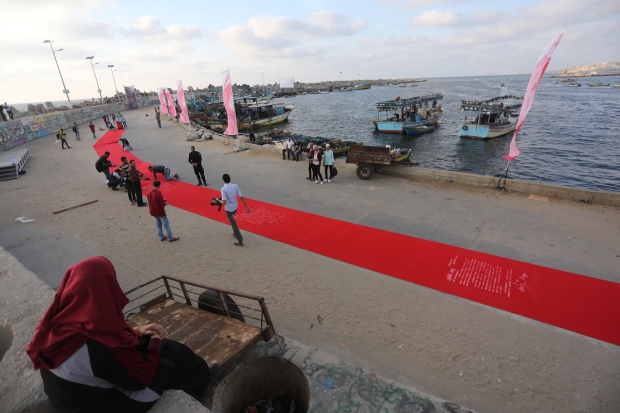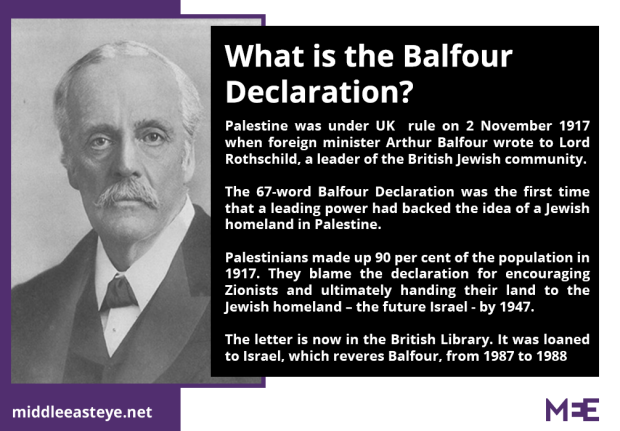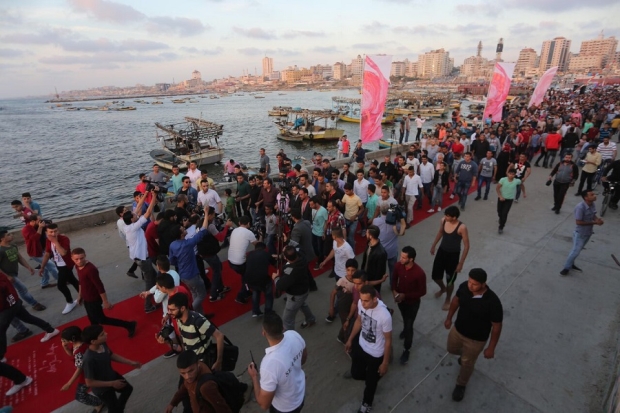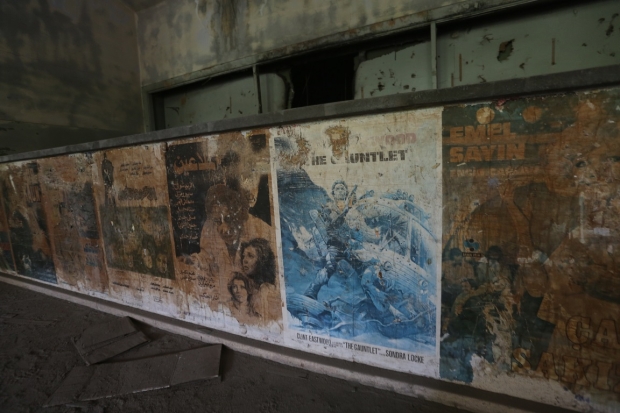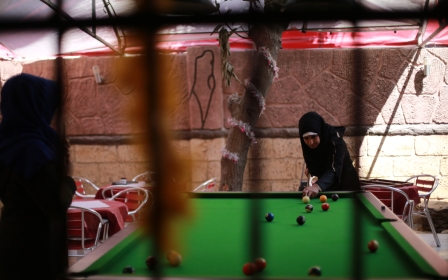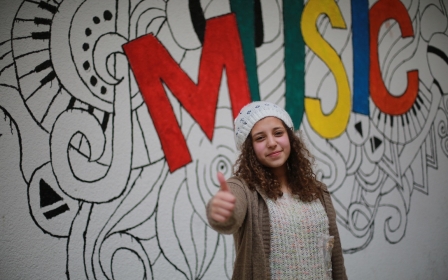'We want to return': Gazan film festival calls out Balfour on the red carpet
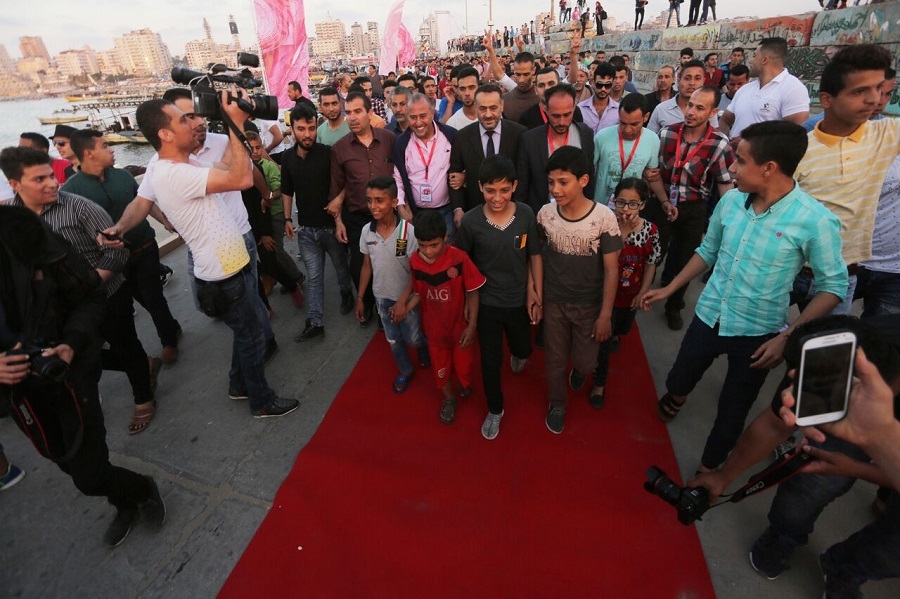
GAZA - “I’ve never gone to a film festival or a real cinema before. It was a dream,” said 19-year-old Ali Khaled during the opening ceremony of the Red Carpet Human Rights Film Festival in Gaza.
“I always watch the Oscar awards on TV and see celebrities walking on the red carpet. I can’t believe that we have one and I’m walking on it right now,” he added.
To commemorate 100 years since the Balfour declaration - which paved the way to establishing the state of Israel - the 100-metre long red carpet was laid down at the port of Gaza. The concrete pavement underneath was built from the remains of houses destroyed during several wars with Israel.
In the 1917 Balfour declaration - which was issued while Palestine was still under British rule - the British government said it viewed "with favour the establishment in Palestine of a national home for the Jewish people".
Palestinians have long condemned the 1917 document as a promise by Britain to hand over Palestinian land that the British did not own to the Jewish people.The organisers also wanted to change the stereotype associated with the red carpet, so the event was open to the public for free.
“All over the world, the red carpet is preserved for stars and celebrities, but we wanted to tell the world that ordinary Gazans and Al-Shajaiya people are the real stars and heroes. They are the ones who deserve a red carpet,” Swairky said.
“The world must see the paradox in our lives as Palestinians. Our heroes are suffering to gain their rights, and we are here to stand with them using art and creativity,” said Swairky, before drinking salt water in solidarity with hunger-striking Palestinian prisoners. For over a month, approximately over 1,000 prisoners in Israeli jails that have been on a hunger strike in protest of the conditions of their detention and basic rights.
The event has been an annual one since 2015 and took place on the fisherman’s wharf along Gaza’s seaside as well as in Ramallah in the occupied West Bank and in Haifa in Israel.
'We want to return; we are here to insist on our right to return to our land'
- Saed al-Swairky, spokesman for the event
“We have never seen any travel bags in this seaport because we live under siege. We are here, at Gaza seaport, to demand our natural right of having a seaport with full freedom of movement,” Swairky added. Gaza has been under Israeli siege since 2007 after Hamas came to power.
According to Swairky, the event is now internationally recognised as an official human rights film festival. “Our festival is the forty-second in the world, and the second to be held in an Arab country.”
Movies and documentaries
The 25 movies showcased were mostly documentaries and some short films. They included The Death Tunnel, a documentary looking at the lives of workers in the tunnels between Gaza and Egypt who risk death in order to obtain essential goods during the siege.
Ships Passing in the Night is a short animation film that tells the story of immigrants in Europe and the challenges they face.
'All over the world, the red carpet is preserved for stars and celebrities, but we wanted to tell the world that ordinary Gazans [are] the real stars and heroes'
- Saed al-Swairky, spokesman for the event
The documentary Ambulance was filmed and directed by 28-year-old Gazan filmmaker Mohammed al-Jabali. In it he shows the world what it was like to be part of an ambulance crew during the 2014 war with Israel.
Jabali joined the ambulance crew and saw close-up the affects of war during which time he was “between life and death,” as he described.
“I wanted to use my talent in a way that can help my people. I wasn’t working with a press agency and the only goal I wanted to achieve was to send a direct and real message of our suffering during the war. And I did it,” Jabali said.
'During wars we stay at home. We don’t know the real heroes and the details of their days under shelling'
- Mohammed al-Jabali, Gazan filmmaker
The young director is now travelling around the world to talk about his documentary.
“During wars we stay at home. We don’t know the real heroes and the details of their days under shelling. While shooting Ambulance, I met a lot of people who taught me how to appreciate life and how to sacrifice to help others,” he added.
Lost cinemas
During the opening ceremony, Mahmoud al-Halaby, 58, and his brother Ahmed, 61, were watching the red carpet on the big display screen, and reminisced about old times. Back in the day, going to the cinema was a normal part of life before Gaza’s theatres were torched during the first Palestinian Intifada in 1987.
Families eager to enjoy a night out would go to one of the three movie theatres available to them in Gaza City. “I used to go to the cinema with my wife when we were engaged. We have a lot of memories there,” Halaby said.
Instead of eating popcorn, Gazans were used to munching on grilled liver sandwiches at the movie theatre.
'The cinema was our only way to discover the world'
- Mahmoud al-Halaby
“My father had a small booth in front of the cinema where he sold grilled liver sandwiches and soft drinks. It was our official snack while watching movies,” Halaby added.
According to Halaby, people stopped going to the movies during the first Intifada because they were caught up in the daily clashes and unrest.
“No one had the time or the desire to watch movies. A few months later, the cinemas were burned during the clashes,” he said.
The movie theatres were later repaired, only to be torched again during internal violence in 1996. Today, with the absence of a cinema in the besieged enclave, Gazans have become accustomed to watching TV in the privacy of their homes.
In January 2016, an initiative was launched to screen films at a rented hall at The Red Crescent Society building.
The screenings came to a halt after a few months, due to continuous interference from authorities in the Gaza strip, according to one of the organisers of the initiative, who preferred to remain anonymous.
The movies had to be approved by authroities before they were screened and any movies deemed inappropriate were banned.
The Red Carpet film festival was welcomed by the people in Gaza, who were happy to watch movies again, especially films that reflect the hardships they face.
"The movies are interesting and they discuss our daily life," Halaby said.
Middle East Eye propose une couverture et une analyse indépendantes et incomparables du Moyen-Orient, de l’Afrique du Nord et d’autres régions du monde. Pour en savoir plus sur la reprise de ce contenu et les frais qui s’appliquent, veuillez remplir ce formulaire [en anglais]. Pour en savoir plus sur MEE, cliquez ici [en anglais].


